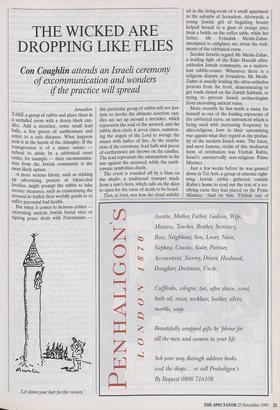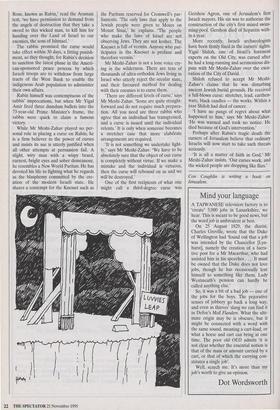THE WICKED ARE DROPPING LIKE FLIES
Con Coughlin attends an Israeli ceremony
of excommunication and wonders
if the practice will spread
Jerusalem TAKE a group of rabbis and place them in a secluded room with a dozen black can- dles. Add a stretcher, some small lead balls, a few pieces of earthenware and retire to a safe distance. What happens next is in the hands of the Almighty. If the transgression is of a minor nature refusal to abide by a rabbinical court order, for example — then excommunica- tion from the Jewish community is the most likely option. A more serious felony, such as sticking up advertising posters of bikini-clad lovelies, might prompt the rabbis to take sterner measures, such as condemning the accused to forfeit their worldly goods or to suffer perennial bad health.
But when it comes to heinous crimes excavating ancient Jewish burial sites or signing peace deals with Palestinians — 'Let down your hair for the viewers.' this particular group of rabbis will not hes- itate to invoke the ultimate sanction: can- dles are set up around a stretcher, which represents the soul of the accused, and the rabbis then circle it seven times, summon- ing the angels of the Lord to avenge the sinner with lashes of fire. At the conclu- sion of the ceremony, lead balls and pieces of earthenware are thrown on the candles. The lead represents the ammunition in the war against the accursed, while the earth- enware symbolises death.
The event is rounded off by a blast on the shofar, a traditional trumpet made from a ram's horn, which calls on the skies to open for the curse of death to be heard. That, at least, was how the ritual unfold- ed in the living-room of a small apartment in the suburbs of Jerusalem. Aferwards, a young Jewish girl of beguiling beauty helped herself to a glass of orange juice from a bottle on the coffee table, while her father, Mr Yehudah Meshi-Zahav, attempted to enlighten me about the rudi- ments of the rabbinical curse.
Secular Israelis regard Mr Meshi-Zahav, a leading light of the Edar Haredit ultra- orthodox Jewish community, as a malevo- lent rabble-rouser. Whenever there is a religious dispute in Jerusalem, Mr Meshi- Zahav is usually leading the ultra-orthodox protests from the front, demonstrating to get roads closed on the Jewish Sabbath, or trying to prevent Israeli archaeologists from excavating ancient ruins.
More recently he has made a name for himself as one of the leading exponents of the rabbinical curse, an instrument which is being used with increasing frequency by ultra-religious Jews in their unremitting war against what they regard as the profan- ity of the modern Israeli state. The latest, and most famous, victim of this mediaeval form of retribution was Yitzhak Rabin, Israel's unreservedly non-religious Prime Minister.
Just a few weeks before he was gunned down in Tel Aviv, a group of extreme right- wing Jewish rabbis gathered outside Rabin's home to read out the text of a ter- rifying curse they had placed on the Prime Minister. 'And on him, Yitzhak son of Rose, known as Rabin,' read the Aramaic text, 'we have permission to demand from the angels of destruction that they take a sword to this wicked man, to kill him for handing over the Land of Israel to our enemies, the sons of Ishmael.'
The rabbis promised the curse would take effect within 30 days, a fitting punish- ment, so they thought, for Rabin's decision to sanction the latest phase in the Ameri- can-sponsored peace process by which Israeli troops are to withdraw from large tracts of the West Bank to enable the indigenous Arab population to administer their own affairs.
Rabin himself was contemptuous of the rabbis' imprecations, but when Mr Yigal Amir fired three dumdum bullets into the 73-year-old Prime Minister's frame, the rabbis were quick to claim a famous victory.
While Mr Meshi-Zahav played no per- sonal role in placing a curse on Rabin, he is a firm believer in the power of curses and insists its use is utterly justified when all other attempts at persuasion fail. A slight, wiry man with a wispy beard, earnest, bright eyes and sober demeanour, he resembles a New World Puritan. He has devoted his life to fighting what he regards as the blasphemy committed by the cre- ation of the modern Israeli state. He shares a contempt for the Knesset such as the Puritans reserved for Cromwell's par- liaments. 'The only laws that apply to the Jewish people were given to Moses on Mount Sinai,' he explains. 'The people who make the laws of Israel are not observing Jews. They are not kosher. The Knesset is full of vermin. Anyone who par- ticipates in the Knesset is profane and therefore vermin.'
Mr Meshi-Zahav is not a lone voice cry- ing in the wilderness. There are tens of thousands of ultra-orthodox Jews living in Israel who utterly reject the secular state, and their favoured method for dealing with their enemies is to curse them.
`There are different levels of curse,' says Mr Meshi-Zahay. 'Some are quite straight- forward and do not require much prepara- tion. All you need are three rabbis who agree that an individual has transgressed, and a curse is issued until the individual relents.' It is only when someone becomes a stretcher case that more elaborate arrangements are required.
`It is not something we undertake light- ly,' says Mr Meshi-Zahay. 'We have to be absolutely sure that the object of our curse is completely without virtue. If we make a mistake and the individual is virtuous, then the curse will rebound on us and we will be destroyed.'
One of the first recipients of what one might call a third-degree curse was Gershon Agron, one of Jerusalem's first Israeli mayors. His sin was to authorise the construction of the city's first mixed swim- ming-pool. Gershon died of hepatitis with- in a year.
More recently, Israeli archaeologists have been firmly fixed in the cursers' sights. Yigal Shiloh, one of Israel's foremost experts on the Old City, was cursed after he had a long-running and acrimonious dis- pute with Mr Meshi-Zahav over the exca- vation of the City of David.
Shiloh refused to accept Mr Meshi- Zahav's claims that he was disturbing ancient Jewish burial grounds. He received a full-blown curse: stretcher, lead, earthen- ware, black candles — the works. Within a year Shiloh had died of cancer.
`I have no pangs of regret about what happened to him,' says Mr Meshi-Zahay. `He was warned and took no notice. He died because of God's intervention.'
Perhaps after Rabin's tragic death the cursers of Jerusalem believe that ordinary Israelis will now start to take such threats seriously.
`It is all a matter of faith in God,' Mr Meshi-Zahav insists. 'Our curses work, and the wicked people are dropping like flies.'
Con Coughlin is writing a book on Jerusalem.



















































































 Previous page
Previous page